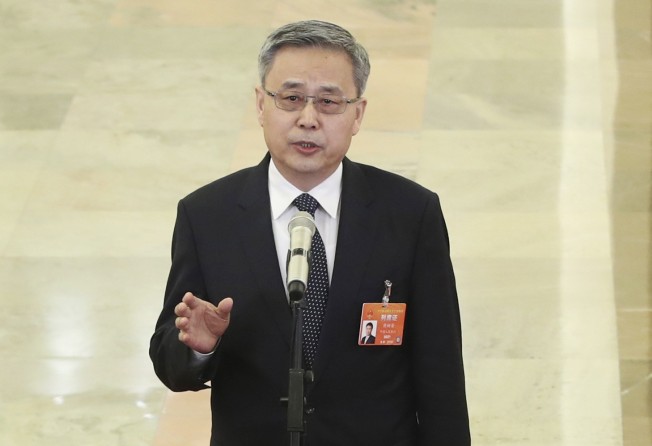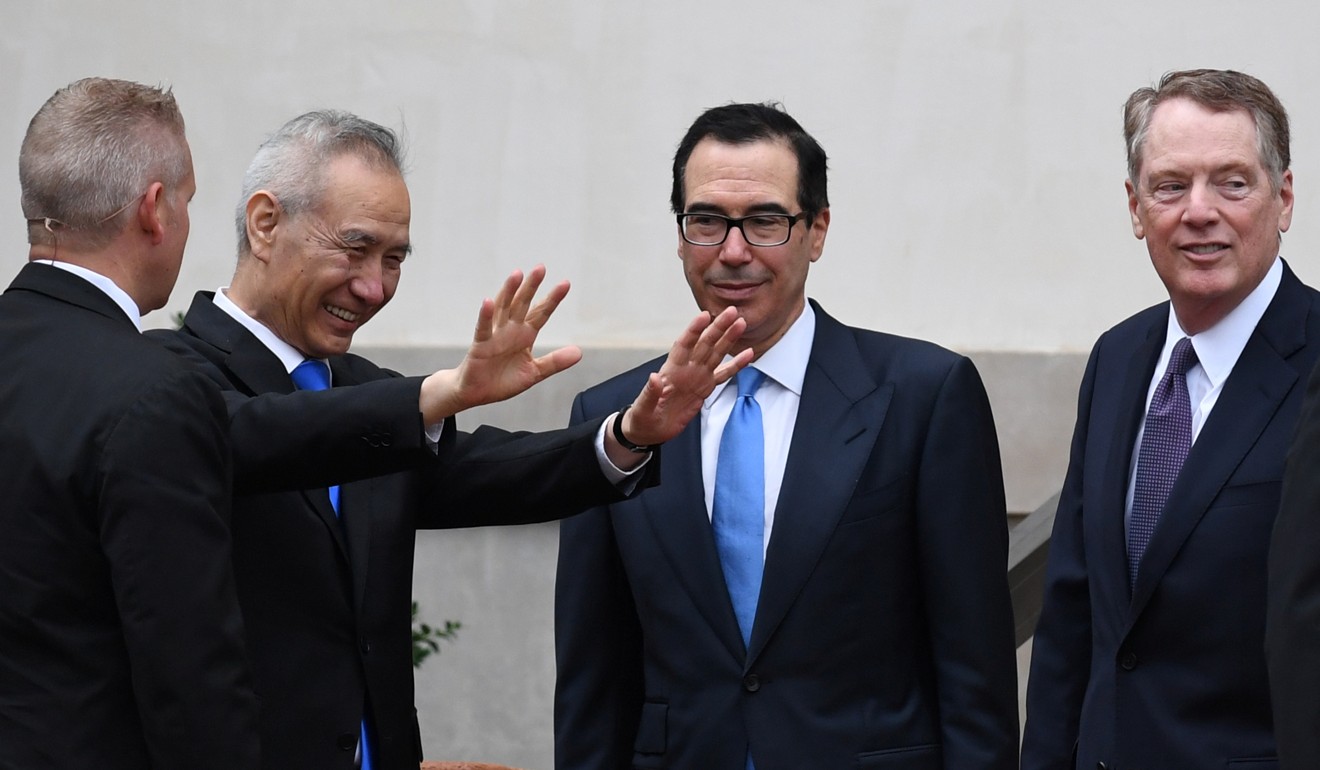China will open financial sector wider amid ‘quite limited’ impact of trade war, regulator says
- Head of banking and insurance regulator Guo Shuqing also tells state TV Beijing has no plans to engineer depreciation of yuan to boost exports
- He says foreign investors in the sectors may be able to take higher stakes in the future that ‘could even reach 61, 71, 81 per cent or even 100 per cent’

China will further open its financial sector despite its trade war with the US, and it has no plans to engineer a currency depreciation to support its exports, its chief financial regulator said.
In an interview with state broadcaster CCTV aired on Monday evening, Guo Shuqing, chairman of the China Banking and Insurance Regulatory Commission, said Beijing would open its doors wider to foreign financial institutions and it was confident it could control any potential fallout from the trade war.
According to Guo, China is focusing on boosting fundraising by its capital markets to support economic growth.
“One of our key [reforms] this year is to accelerate the development of the direct fundraising ability of our capital markets in order to support our economic development,” said Guo, who is also the Communist Party official overseeing the People’s Bank of China.
To facilitate that, Guo said China would widen access for foreign financial institutions.
“We will continue to expand the opening of our banking and insurance sectors. In the future, the controlling stake of foreign investors will not be limited to just 51 per cent, but [the ceiling] could even reach 61 per cent, 71 per cent, 81 per cent or even 100 per cent,” Guo said.
“We hope there will be more foreign institutions, especially high-quality and world famous institutional investors, coming to China,” he added.
Guo also played down market speculation about a depreciation of the yuan, saying the Chinese government had no plans to engineer a lower value of the currency to boost exports.
“There was only one reason behind the fall [in early May] and that was the unilateral decision by the US government to increase the tariffs, and this has caused instability in the financial markets. Because of that, some people thought this would affect China’s exports to the US and also impact world trade and the global economy,” Guo said.
“As a result, the yuan was exposed to depreciation pressure and this was entirely the result of market [sentiment]. We have never taken any intentional measures that would cause depreciation of the yuan to offset [the impact] of conflicts over trade.”
The chief regulator also said Beijing was fully capable of controlling financial risks and China’s situation had significantly improved compared with two years ago.
“Overall, our financial risk is under control. In the past two years we have reduced the high-risk assets [of financial institutions] by 12 trillion yuan. Because of that, we have effectively controlled our risks ... [Financial risks] have moved from the past status of ‘expanding’ to the current state of ‘retreat’.”
He added that Beijing had taken a “proactive approach” to handling risks instead of “waiting until a crisis happens”.

Guo’s latest remarks came amid a rising tide of nationalist sentiment, with critics saying Beijing should not surrender in the ongoing trade war with Washington.
Vice-Premier Liu He, who has led the Chinese trade negotiations, said at the last round of talks in Washington that he had come to the US “against pressure” in order to show Beijing’s sincerity.
Speaking in Tokyo on Monday, US President Donald Trump said the US was not ready to make a trade deal with China and the US tariffs on Chinese goods “could go up very, very substantially, very easily”.
In the interview, Guo dismissed the impact of higher US tariffs, saying the Chinese economy remained stable and was moving in the right direction.
“One year has now passed [since the China-US trade conflict began] and we can see that the problem is not that serious and the real impact on [our] economy is quite limited,” he said.
“Our economy is stable and moving in a positive direction, and we continue our efforts to adjust our economic system ... and we have not seen panic in our financial markets – either the stock market or the foreign exchange market, or among the public.”
On Monday, state-run nationalist tabloid Global Times ran an editorial saying people who wanted China to “surrender” in its trade dispute with the US would eventually find themselves on the wrong side of history.
“There are people who would advocate [for China to] surrender every time when the country faces a serious external threat,” the editorial said. “History will condemn these people ... for failing to stand on the side of the Chinese people.”
Singling out an article that was circulated on social media network WeChat, the editorial said there was a small group of people in the country who wished to see the US “succeed in oppressing China”.
It also said that while there were different views about the trade war in China, unity was the country’s best defence in dealing with the US.
The Global Times editorial, which often diverged from Beijing’s official line in its ultra-nationalistic arguments, came two weeks into a state media campaign aimed at stoking patriotic sentiment – something that Beijing has not allowed for almost a year since the trade war started in July.